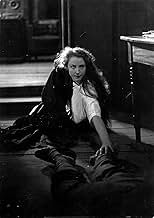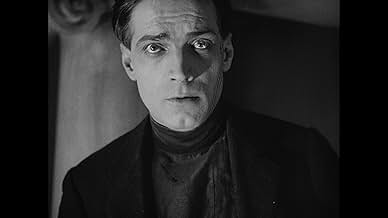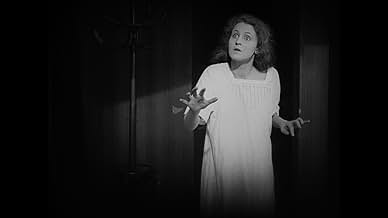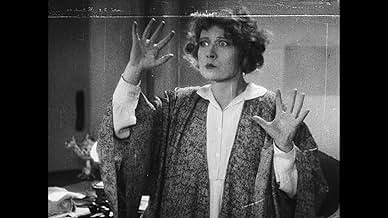NOTE IMDb
7,2/10
929
MA NOTE
En Crimée, les Rouges et les Blancs n'ont pas fini de se battre et Jeanne découvre que l'homme qu'elle aime est un Bolchevique (quand il tue son père). Sans le sou, elle retourne à Paris où ... Tout lireEn Crimée, les Rouges et les Blancs n'ont pas fini de se battre et Jeanne découvre que l'homme qu'elle aime est un Bolchevique (quand il tue son père). Sans le sou, elle retourne à Paris où elle travaille pour son oncle.En Crimée, les Rouges et les Blancs n'ont pas fini de se battre et Jeanne découvre que l'homme qu'elle aime est un Bolchevique (quand il tue son père). Sans le sou, elle retourne à Paris où elle travaille pour son oncle.
- Réalisation
- Scénario
- Casting principal
Margarete Kupfer
- Hotel Maid
- (as Küpfer)
Robert Scholz
- Chief of Police
- (as Scholz)
Avis à la une
Love of Jeanne Ney(1927) is an involving Wartime melodrama with images that impress. Definitely the work of a great director in G.W. Pabst who is the second greatest filmmaker in German Silent films right after Fritz Lang. Includes a post Metropolis role for Brigitte Helm. Acting is very good and the set designs are some of the best in Silent cinema. A downbeat film with a contrasting happy ending.
Just saw this film and was very impressed with the style and story. Like all the others who have commented, I was immediately drawn in to the story and characters. Even though there were minimal subtitles, the story was not difficult to follow. It is a different way to tell a story where body movement and gestures replace the voice. The orchestral soundtrack was well matched to the mood and action. I had never heard of this film and only found it by accident when searching on whatever became of Bridgit Helm who did not pursue acting after (?) this final film. It is also a historical drama and has interesting details of life in that time. Definitely one of the great films of that era.
Probably the most famous movies focusing on the revolution are David Lean's "Dr. Zhivago" (about a physician caught up in the revolution) and Warren Beatty's "Reds" (about US journalist John Reed, who covered the revolution). A lesser known one is "Die Liebe der Jeanne Ney" ("The Love of Jeanne Ney" in English). The convoluted plot of G. W. Pabst's movie depicts intrigue and treachery in the wake of the revolution, with the titular character - the daughter of a French diplomat - in love with a Bolshevik.
The movie is hard to follow at times; this isn't some Michael Bay movie where you can simply shut your brain off to watch it. Even so, you'll feel fulfilled by the end of it. The only cast member whom I recognized was Brigitte Helm, who that same year played the Machine Man in Fritz Lang's "Metropolis".
Not a masterpiece, but worth seeing.
The movie is hard to follow at times; this isn't some Michael Bay movie where you can simply shut your brain off to watch it. Even so, you'll feel fulfilled by the end of it. The only cast member whom I recognized was Brigitte Helm, who that same year played the Machine Man in Fritz Lang's "Metropolis".
Not a masterpiece, but worth seeing.
Georg Wilhelm Pabst (or GW Pabst, born in 1885) was one of the great German filmmakers during the silent period. He established his name with his first film, the drama of greed "The Treasure" (1923), but with the third one, "The Joyless Street" (1925) he revealed himself as a major force of the "New Objectivity", beyond the distortions of expressionism, touching the social problems of Germany, between the two great wars. He continued with "Mysteries of a Soul" (1926) and "The Love of Jeanne Ney" (1927), whose recent vision motivates these notes; then gave a masterstroke with "Pandora's Box" (1929), which led Louise Brooks to immortality, and when sound came, in 1930 he released the antiwar drama" Frontline 1918 ", which was banned by the Nazis, made the film version of "The 3-Penny Opera" (1931) by Brecht and Weil, followed by a drama of Franco-German solidarity, "Camaraderie" (1931); an incursion into fantastic cinema with "L'Atlantide" (1932), and his own reading of Cervantes' "Don Quixote" (1933). Although he did not stop working and made more films of value, Pabst saw his career affected by the rise of the Nazis, when he had to move between Berlin, Paris, Hollywood and Vienna, where he died in 1967.
The romantic account of "The Love of Jeanne Ney" goes from Ukraine to France, following the daughter of a French diplomat who is in love with a Bolshevik. The couple reunites in Paris after several vicissitudes. The characters include Jeanne's uncle, owner of a research firm, his blind daughter (Brigitte Helm, the Maria of "Metropolis"), a North American millionaire who has lost an invaluable diamond, and a Russian informer who sells to the highest bidder. There are moments of great visual force, as the scene in which the blind girl discovers the corpse of her father and the initial scenes of the Russian revolution.
However, the reason that motivates me to write about the film is, above all, extraordinary actor Fritz Rasp (1891-1976), as the ruthless snitch, fearsome as none. Rasp is an icon of the Teutonic villain: from the first time I saw him as the overwhelming "Thin Man" in Lang's "Metropolis," serving the owner of the city, every time I see him in another film, his characters are not to be trusted and his presence is intimidating: as the colonel in "Spies" and as "The Man" in "The Woman in the Moon", both by Lang, or as the Jew J. J. Peachum, "King of the Beggars", in Pabst's "The 3-Penny Opera". In "The Love of Jeanne Ney" Rasp builds the disgusting character of Khalibiev, an informant who fingers the Bolsheviks in Ukraine, and in Paris not only does he stalk Jeanne and her lover, but uses Jeanne's young blind cousin to concrete his evil plans.
As Pabst, Rasp also continued working during the Nazi period, although not acting with the frequency of the past. He had a long career, that included playing the lead in a film of the "new cinema" of West Germany, "Lina Braake" (1975), which was his last appearance in cinema.
The romantic account of "The Love of Jeanne Ney" goes from Ukraine to France, following the daughter of a French diplomat who is in love with a Bolshevik. The couple reunites in Paris after several vicissitudes. The characters include Jeanne's uncle, owner of a research firm, his blind daughter (Brigitte Helm, the Maria of "Metropolis"), a North American millionaire who has lost an invaluable diamond, and a Russian informer who sells to the highest bidder. There are moments of great visual force, as the scene in which the blind girl discovers the corpse of her father and the initial scenes of the Russian revolution.
However, the reason that motivates me to write about the film is, above all, extraordinary actor Fritz Rasp (1891-1976), as the ruthless snitch, fearsome as none. Rasp is an icon of the Teutonic villain: from the first time I saw him as the overwhelming "Thin Man" in Lang's "Metropolis," serving the owner of the city, every time I see him in another film, his characters are not to be trusted and his presence is intimidating: as the colonel in "Spies" and as "The Man" in "The Woman in the Moon", both by Lang, or as the Jew J. J. Peachum, "King of the Beggars", in Pabst's "The 3-Penny Opera". In "The Love of Jeanne Ney" Rasp builds the disgusting character of Khalibiev, an informant who fingers the Bolsheviks in Ukraine, and in Paris not only does he stalk Jeanne and her lover, but uses Jeanne's young blind cousin to concrete his evil plans.
As Pabst, Rasp also continued working during the Nazi period, although not acting with the frequency of the past. He had a long career, that included playing the lead in a film of the "new cinema" of West Germany, "Lina Braake" (1975), which was his last appearance in cinema.
8RNQ
Like most films, The Love of Jeanne Ney is a melodrama, one of the right sort that absorbs you in the story. One hook is, or was, political, with a choice of sides in the Civil War in Russia, refined as support for workers in France, including Jeanne at her typewriter while her uncle does fancy deals. The lasting hook is the skill with which the film is made, particularly the handling of scenes on a train and outdoor scenes. These include lengthy tracking shots well edited together: the hero, running to keep up with an automobile, and especially a long walk through crowds in the market of Les Halles in Paris, which is Atget in motion. Without Pabst, no Renoir, no Altman.
Le saviez-vous
- AnecdotesMilly Mathis's debut.
- Versions alternativesTwo different edits of the film exist. The A Negative, for the American market (86 mins) and the B negative, for the German market (105 mins). The two versions feature different camera angles and some cuts were made for the American market.
- ConnexionsFeatured in Die UFA (1992)
Meilleurs choix
Connectez-vous pour évaluer et suivre la liste de favoris afin de recevoir des recommandations personnalisées
Détails
- Durée
- 1h 44min(104 min)
- Mixage
- Rapport de forme
- 1.33 : 1
Contribuer à cette page
Suggérer une modification ou ajouter du contenu manquant





































